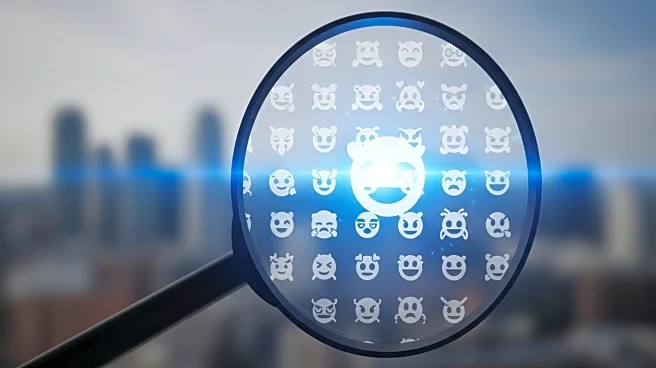What is the story about?
What's Happening?
US law enforcement agencies, including the FBI and Customs and Border Protection, have claimed that certain emojis used on social media may indicate affiliation with Tren de Aragua, a Venezuelan gang. This assertion is based on internal records reviewed by the Guardian, which detail briefings and threat warnings disseminated among law enforcement officials. The emojis in question include trains, swords, ninjas, aliens, and strawberries, which are alleged to be part of a 'code language' used by gang members. These claims have been met with skepticism from gang experts and immigration attorneys, who argue that such associations are baseless and could lead to wrongful accusations and deportations. The Trump administration has previously cited Tren de Aragua to justify immigration crackdowns and military actions, despite experts questioning the gang's organized presence in the US.
Why It's Important?
The implications of these claims are significant, as they could affect immigration policies and enforcement actions in the US. If emojis are used as indicators of gang affiliation, it could lead to increased profiling and deportation of individuals based on tenuous evidence. This approach raises concerns about civil liberties and the potential for misuse of power by law enforcement agencies. The controversy also highlights the broader issue of how digital communication symbols are interpreted in legal and security contexts, potentially impacting social media users and immigrant communities. The skepticism from experts suggests a need for more informed and evidence-based approaches to gang identification and immigration enforcement.
What's Next?
The debate over the use of emojis as gang indicators may prompt further scrutiny and discussion among policymakers, legal experts, and civil rights advocates. There could be calls for clearer guidelines and evidence-based practices in law enforcement to prevent wrongful accusations and protect individual rights. Additionally, the controversy may lead to increased advocacy for immigrant communities, emphasizing the need for fair and just treatment in immigration proceedings. As the situation evolves, stakeholders may seek to address the balance between national security concerns and civil liberties.
Beyond the Headlines
The use of emojis as alleged gang symbols raises broader questions about digital literacy and the interpretation of online communication in legal contexts. It underscores the challenges of adapting traditional law enforcement methods to the complexities of digital communication. This development may also reflect cultural misunderstandings and biases in the assessment of immigrant communities, highlighting the need for culturally competent approaches in law enforcement and public policy.















